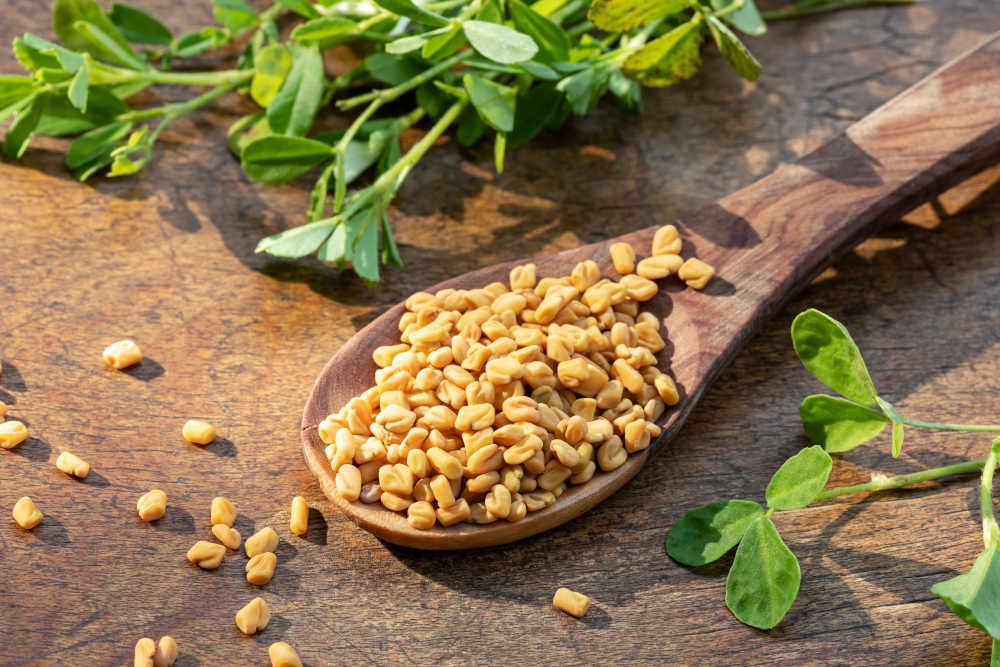
Fenugreek Extract
Trigonella foenum-graecum L. is one of the oldest known medicinal plants which belongs to the Fabaceae family. Fenugreek extract is produced from the plant Trigonella foenum-graecum L., which is commonly known as fenugreek. Fenugreek plant has trifoliate light green leaves, yellowish-white triangular flowers and pods that contain small golden-brown seeds. The erect and loosely branched plant generally grows up to 30-60 cm. Trigonella foenum-graecum L. may grow well under a wide variety of conditions and can be grown profitably even on marginal lands. It is moderately tolerant to drought and salinity. (1)
Medicinal Usage
Fenugreek seeds have been used since ancient times because of their nutraceutical and medicinal benefits. The plant has anti-biotic, anti-oxidant, anti-carcinogen and anti-diabetic medicinal properties. Fenugreek is also used to treat inflammation of the stomach and digestive problems and to suppress appetite. In a study, weight losses of obese rats being fed with fenugreek seed powder are observed due to the capability of galactomannan in the seeds to capture and excrete the body sugar before migrating into the blood. (2) In another study published in 2013, it is stated that fenugreek seeds may suppress hunger by slowing down digestion and absorption from the intestine. (3) It is shown in a further study which includes 3 groups of 3 people that the group consuming fenugreek felt less hungry than others consuming a different herbal products. (4)
As a conclusion, fenugreek might be used as a medicinal plant for various purposes. It can be used as an anti-inflammatory agent due to the presence of substantial levels of anti-oxidants in the plant. It may help stabilize the blood glucose and lipid levels and appetite suppressant properties. Additionally employed in many traditional systems as an anti-bacterial and gastric stimulant.
Chemistry Behind
Fenugreek seeds contain a high amount of crude protein, dietary fibre, fatty acids, amino acids and minerals. Omega-3 fatty acids and dietary fibre, as well as a water-soluble polysaccharide called galactomannan, are thought to contribute to the effects of fenugreek on metabolic functions. (4) Steroidal saponins, especially diosgenin, polysaccharides, flavones and alkaloids, are the main chemical constituents of fenugreek seed extract. (5) High-quality fenugreek extract of Bionorm produced from the seeds contains more than 50% of total saponins.
References
1. Ahmad A, Alghamdi SS, Mahmood K, Afzal M. Fenugreek a multipurpose crop: Potentialities and improvements. Saudi J Biol Sci. 2016 Mar;23(2):300-10. doi:10.1016/j.sjbs.2015.09.015. Epub 2015 Sep 14 PMID: 27307778; PMCID:PMC4894452.
2. J.R. Mathern, S.K. Raatz, W. Thomas, J.L. Slavin Effect of Fenugreek Fiber on Satiety, Blood Glucose and Insulin Response and Energy Intake in Obese Subjects Phytother. Res., 23 (2009), pp. 1543-1548
3. M. Marzouk, A.M. Soliman, T.Y. Omar. Hypoglycemic and antioxidative effects of fenugreek and termis seeds powder in streptozotocin-diabetic rats Eur. Rev. Med. Pharmacol. Sci. (2013), pp. 559-565
4. S. Punar,, R. Sharma,, L. Ram,, K.R. Mahala,, R.K. Maheshwari, Amazing Health Benefit of Fenugreek (Trigonella foenum-graecum leguminosse) Acta Scientific Microbiology, 3 (2020), pp. 108-111
5. Ling Yang, Liang Chen, Ke Zheng, Yu-Jing Ma, Rong-Xiang He, Muhammed Adebayo Arowolo, Ying-Jun Zhou, Ding-Fu Xiao, Jian-Hua He, Effects of fenugreek seed extracts on growth performance and intestinal health of broilers,Poultry Science,Volume 101, Issue 7, 2022,101939,ISSN 0032-5791. doi: 10.1016/j.psj.2022.101939.

